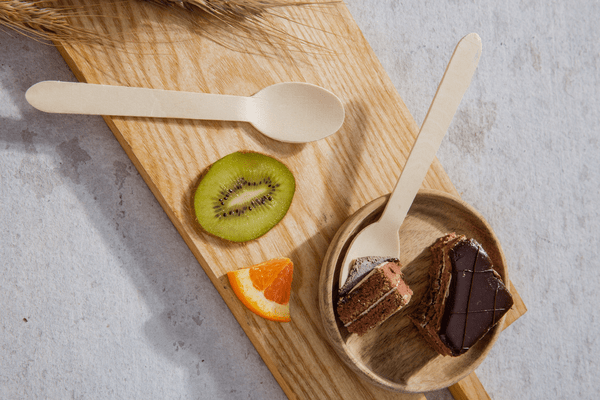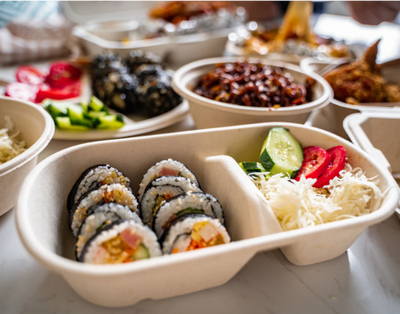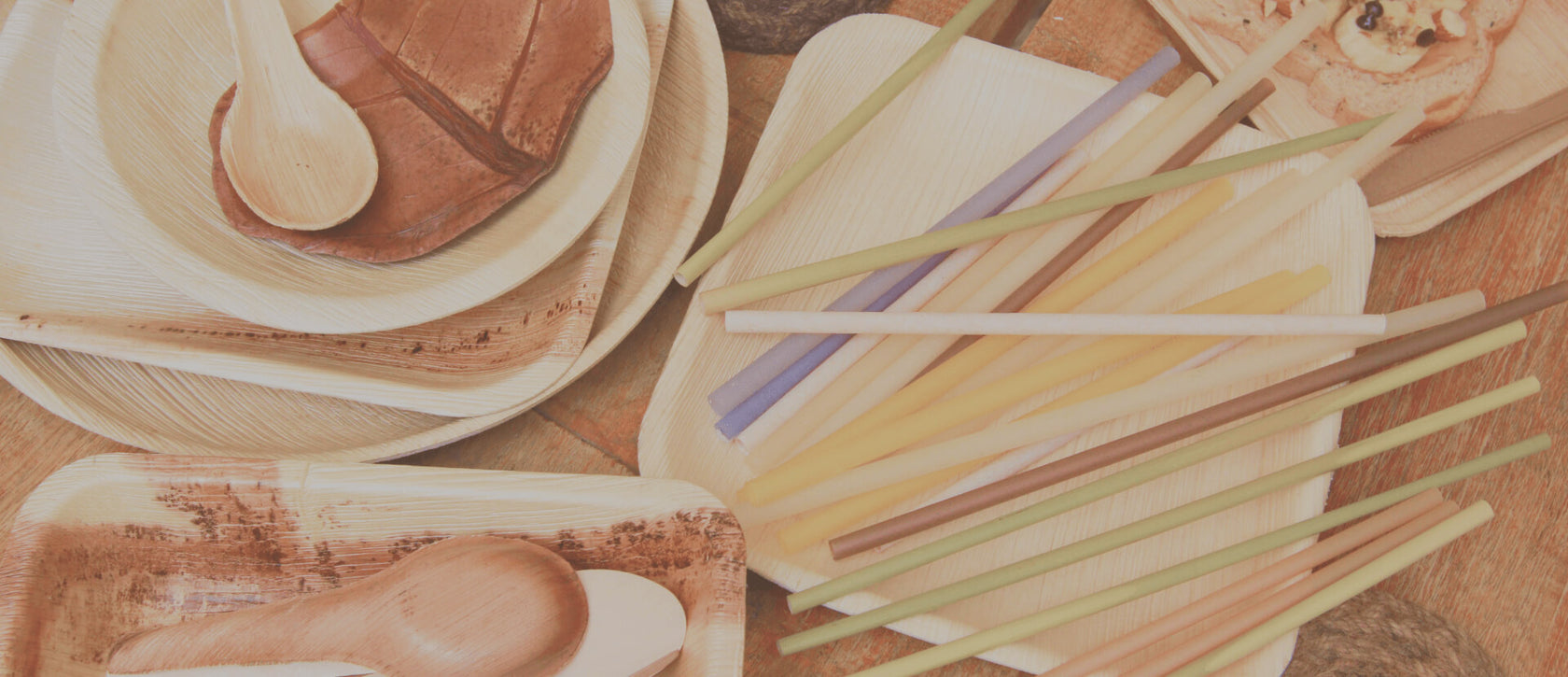Là chủ quán cà phê hoặc nhà hàng, bạn biết tầm quan trọng của việc chánh niệm và bền vững. Đảm bảo hoạt động kinh doanh của bạn thân thiện với môi trường nhất có thể là chìa khóa để bảo vệ môi trường và bảo vệ hành tinh của chúng ta.
Hãy cùng thảo luận về những đồ dùng có thể phân hủy trên thị trường mà bạn có thể mua với số lượng lớn. Đã đến lúc chúng ta phải có trách nhiệm với môi trường và bắt đầu sử dụng các sản phẩm bền vững. Hãy đọc tiếp để khám phá 6 loại đồ dùng có thể phân hủy tốt nhất hiện nay trên thị trường!
Đồ dùng có thể phân hủy được làm bằng gì?
Đồ dùng có thể phân hủy là một cách tuyệt vời để giảm dấu chân môi trường của chúng ta, vì chúng được làm từ vật liệu bền vững và có thể phân hủy sinh học. Khi tiến hành ủ phân những đồ dùng này, cuối cùng chúng sẽ phân hủy thành các thành phần tự nhiên mà không để lại bất kỳ chất thải không cần thiết nào.
Dưới đây là một số vật liệu phổ biến nhất được sử dụng để làm đồ dùng có thể phân hủy:
Bã mía
Bã mía là chất thải hữu cơ còn sót lại sau khi ép lấy nước từ thân cây mía. Sản phẩm phụ này thường được đốt hoặc vứt bỏ tại các bãi chôn lấp, vì vậy việc tìm cách tái sử dụng nó thành các sản phẩm có giá trị sẽ giúp giảm dấu chân môi trường của chúng ta.
Do đó, các nhà sản xuất đã bắt đầu biến loại vật liệu phế thải này thành các loại dao, kéo có thể phân hủy như nĩa, dao và thìa do độ bền nhưng lại tạo cảm giác nhẹ. Dụng cụ làm từ mía là sự lựa chọn hoàn hảo cho các bữa ăn mang đi cũng như các sự kiện phục vụ ăn uống, nơi cần những vật dụng dùng một lần.
EQUAO có các dụng cụ làm mía được làm hoàn toàn từ bã mía và sợi thực vật. Dao kéo của chúng tôi có cảm giác giống như dao kéo nhựa thông thường. Tuy nhiên, chúng bền vững hơn vì không chứa nhựa gốc dầu mỏ hoặc các hóa chất khắc nghiệt có thể thấm vào hệ thống đất hoặc nước khi xử lý không đúng cách.

>> Đọc thêm:
- Ống hút cà phê làm từ bã cà phê: Sự lựa chọn mới thân thiện với môi trường
- 7 loại ống hút có thể phân hủy sinh học tốt nhất được làm từ thực vật
- 5 Nguyên Liệu Tốt Nhất Để Làm Ống Hút Phân Hủy Sinh Học
- Ống hút mía phân hủy sinh học thân thiện với môi trường: Bạn có thể ăn chúng không?
- Ống Hút Cỏ: Sản Phẩm Thân Thiện Với Môi Trường Có Xuất xứ từ Việt Nam
- Ống Hút Gạo: Hướng Dẫn Đầy Đủ Về Ống Hút Ăn Được Thân Thiện Với Môi Trường Mới
- Ống Hút Dừa: Giải Pháp Thay Thế Bền Vững Cho Ống Hút Nhựa
Bã cà phê
Bã cà phê đã trở thành nguyên liệu ngày càng phổ biến để làm đồ dùng có thể phân hủy trong những năm gần đây. Vật liệu nhẹ và bền này có thể được sử dụng để làm thìa, nĩa, dao và các loại dao, kéo khác có thể chịu được việc sử dụng thường xuyên mà không bị gãy hoặc biến dạng.
Dụng cụ pha cà phê có khả năng phân hủy sinh học và sẽ không gây hại cho môi trường khi được xử lý đúng cách. Ngoài ra, bã cà phê còn cung cấp thêm kết cấu và hương vị cho các sản phẩm này, khiến chúng trở nên độc đáo và hấp dẫn về mặt thị giác. Hơn nữa, dụng cụ pha cà phê của chúng tôi còn có khả năng chịu nhiệt và chống dầu mỡ.

Gỗ
Gỗ là nguồn tài nguyên tái tạo nổi tiếng để chế tạo các mặt hàng thân thiện với môi trường, bao gồm cả đồ dùng bằng gỗ có thể phân hủy sinh học. Đồ dùng bằng gỗ rất dễ làm sạch chỉ bằng nước ấm và dung dịch xà phòng nhẹ nên không cần sử dụng hóa chất mạnh hay chà rửa thêm. Ngoài ra, dụng cụ bằng gỗ không hấp thụ mùi hoặc hương vị thức ăn từ những lần sử dụng trước, vì vậy chúng hoàn hảo cho nhiều bữa ăn trong ngày.
Ngoài ra, không giống như các đồ nhựa, những đồ dùng bằng gỗ này không thải ra chất độc hại khi thải ra môi trường hoặc qua quá trình ủ phân. Hơn nữa, những dụng cụ bằng gỗ này có khả năng chịu nhiệt và dầu mỡ cao – lý tưởng để đựng thức ăn nóng.

Cây tre
Tre là loại cây phát triển nhanh, trưởng thành sau 3-5 năm, khiến nó trở thành vật liệu lý tưởng để làm đồ dùng có thể phân hủy. Đây là một trong những nguồn tài nguyên có khả năng tái tạo cao nhất, không cần phân bón hoặc thuốc trừ sâu độc hại để phát triển. Điều này làm cho nó thậm chí còn tốt hơn cho môi trường.
Tre cũng có một số đặc điểm độc đáo khiến nó trở thành sự lựa chọn tuyệt vời để làm đồ dùng có thể phân hủy: tre chắc chắn, bền nhưng nhẹ; kháng khuẩn tự nhiên; không độc hại và không mùi; chịu nhiệt lên tới 752°F (400°C); không gây dị ứng; và không bị ố màu.
Hơn nữa, đồ dùng bằng tre rất đẹp. Màu sắc tự nhiên của tre mang lại cho các dụng cụ một vẻ ngoài độc đáo, tạo thêm nét đặc sắc cho bất kỳ cách bày trí bàn ăn hoặc bữa tiệc dã ngoại nào.

Nguồn: Internet
Lá Cây Cọ
Lá cây cọ được thu hoạch từ một số loài cây cọ, điển hình là ở vùng khí hậu nhiệt đới.
Khi thu hoạch, lá được cắt thành hình đĩa, bát trước khi đem phơi nắng vài ngày. Quá trình sấy khô tự nhiên này làm cho chúng có khả năng chịu nhiệt và đủ bền để giữ thực phẩm an toàn mà không dễ bị vỡ.
Lá cây cọ độc đáo ở chỗ chúng có thể phân hủy sinh học và có thể phân hủy, nghĩa là chúng phân hủy mà không gây hại cho môi trường hoặc động vật hoang dã khi được xử lý đúng cách. Chúng cũng có khả năng chống thấm nước tự nhiên, hoàn hảo để đựng thức ăn ướt như súp hoặc cà ri mà không làm rò rỉ chất lỏng ra quần áo và tay.

Nguồn: Internet
Tinh bột thực vật
Nhiều loại cây khác nhau, bao gồm ngô và khoai tây, có thể được sử dụng để tạo ra nhựa sinh học có thể phân hủy. Nguồn gốc này làm cho đồ dùng làm từ tinh bột thực vật không độc hại và an toàn với môi trường. Những loại nhựa này không có nguồn gốc từ các hóa chất gốc dầu mỏ và có thể phân hủy thành carbon dioxide, nước và sinh khối khi được ủ trong cơ sở phân trộn công nghiệp.
Điều này không có nghĩa là nhựa sinh học không góp phần vào việc phát thải nhiên liệu hóa thạch hoặc bù đắp chúng, vì quá trình sản xuất chúng vẫn sẽ thải ra khí nhà kính nếu chúng được sản xuất bằng điện từ nhiên liệu hóa thạch.

Nguồn: Internet
Cách vứt bỏ đồ dùng có thể phân hủy
Ủ phân là một cách tuyệt vời để giảm thiểu chất thải và giúp ích cho môi trường. Biết cách vứt bỏ các dụng cụ có thể phân hủy đúng cách là điều cần thiết, vì không phải loại nào cũng có thể được ủ phân theo cách tương tự.
Dụng cụ làm từ tinh bột thực vật là những dụng cụ có thể phân hủy được, cần nhiệt độ cao để phân hủy. Vì vậy, chúng có thể được xử lý trong cơ sở sản xuất phân trộn công nghiệp. Cơ sở này chuyên phân hủy các vật liệu hữu cơ như tinh bột thực vật thành các sản phẩm có giá trị như phân bón và chất điều hòa đất.
Thay vào đó, các đồ dùng có thể phân hủy khác, chẳng hạn như bã mía, tre và lá cọ, có thể được đặt trong đống phân trộn ở sân sau. Đống phân trộn đòi hỏi ít bảo trì hơn so với các cơ sở công nghiệp vì môi trường tự nhiên giúp phân hủy vật liệu nhanh hơn. Hãy chắc chắn rằng bạn có đủ đất cho một đống lớn trước khi bắt đầu trồng ở nhà!

Nguồn: Internet
>> Đọc thêm:
- Có thể phân hủy và có thể tái chế: Sự khác biệt là gì?
- Cách Tái Chế Và Xử Lý Ống Hút Nhựa An Toàn Và Đúng Cách
- Ống Hút Giấy Vs Ống Hút Nhựa: Bạn Có Nên Chuyển Sang Ống Hút Giấy?
- 5 Lợi Ích Của Việc Sử Dụng Ống Hút Uống Phân Hủy Sinh Học
- Ống hút có thể phân hủy: Ống hút làm từ thực vật so với ống hút giấy
Mua số lượng lớn đồ dùng có thể phân hủy tốt nhất ở đâu?
Có một số lựa chọn cho những ai đang tìm kiếm số lượng lớn đồ dùng có thể phân hủy tốt nhất. Một lựa chọn là đến chợ nông sản địa phương hoặc cửa hàng thực phẩm tốt cho sức khỏe, nơi các nhà cung cấp có thể bán số lượng lớn đồ dùng có thể phân hủy. Bạn cũng có thể mua sắm trực tuyến và mua hàng từ các công ty bền vững chuyên về các sản phẩm thân thiện với môi trường.
Một nơi tốt để mua số lượng lớn đồ dùng có thể phân hủy là EQUA. Chúng tôi cung cấp nhiều lựa chọn về đồ dùng có thể phân hủy đã được chứng nhận, như bã mía, gỗ và bã cà phê. Tất cả các vật dụng này đều không độc hại và có thể phân hủy sinh học, vì vậy chúng sẽ không thải ra các hóa chất độc hại cho môi trường khi thải bỏ.

Nguồn: Internet
Đồ dùng có thể phân hủy là giải pháp thay thế bền vững, thân thiện với trái đất cho đồ dùng bằng nhựa truyền thống. Với tính chất có thể tái tạo và phân hủy sinh học, các dụng cụ có thể phân hủy giúp giảm lượng rác thải nhựa tạo ra và giảm thiểu lượng khí thải carbon của chúng ta.
Nếu bạn đang tìm kiếm đồ dùng có thể phân hủy số lượng lớn hoặc ống hút phân hủy sinh học số lượng lớn , EQUAO là nhà cung cấp đáng tin cậy cung cấp các sản phẩm chất lượng với giá cả cạnh tranh!
Thông tin liên lạc:
- Trang web: https://shopequo.com
- Trang web: https://www.facebook.com/equointl
- Twitter: https://twitter.com/equointl
- Linkedin: https://www.linkedin.com/showcase/equo-international/
- Instagram: https://www.instagram.com/equointl/






